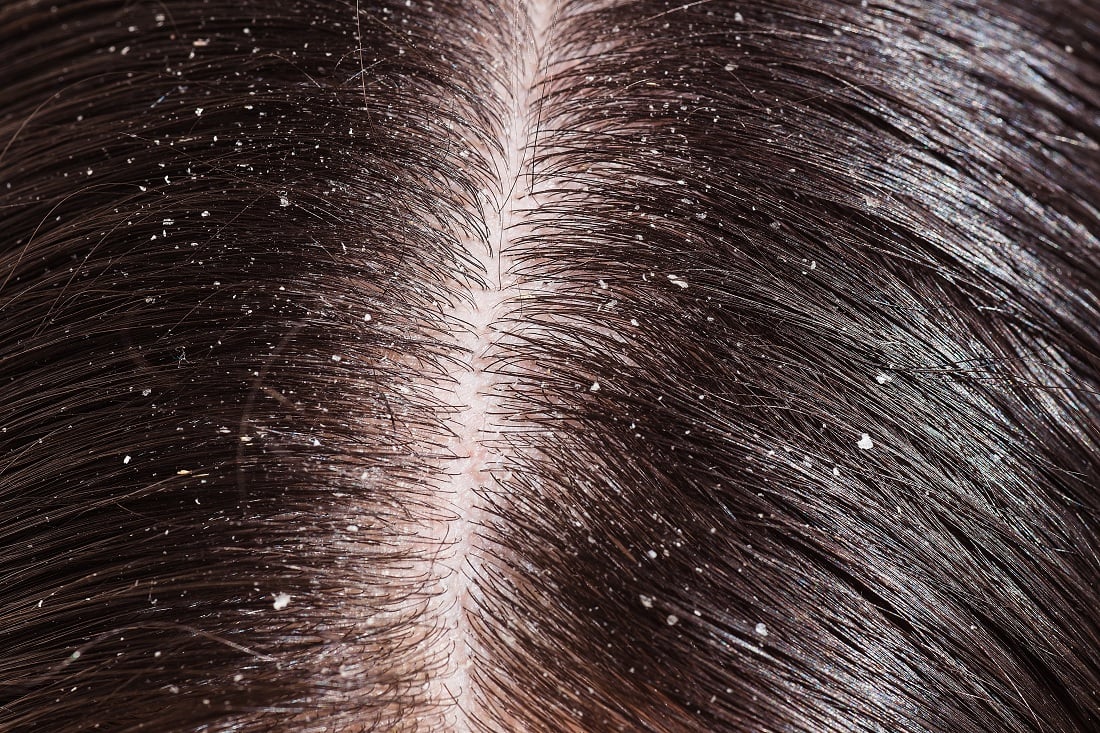Dandruff is a common scalp condition characterized by flaking skin, itchiness, and irritation. While not a serious medical concern, it can be bothersome and affect one’s confidence. Here’s a comprehensive overview of dandruff, its causes, symptoms, and risk factors
Causes
- Irritated, Oily Skin: Overactive sebaceous glands can lead to excess oil production, causing skin cells to clump together and flake off, resulting in dandruff.
- Dry Skin: On the contrary, dry skin can also trigger dandruff, as flaking occurs when the skin sheds its dead cells too quickly.
- Yeastlike Fungus (Malassezia): This common fungus naturally resides on the scalps of most adults. However, an overgrowth of this fungus can contribute to dandruff. Malassezia feeds on scalp oils, producing substances that irritate the skin and cause flaking.
- Sensitivity to Hair Care Products: Certain hair care products, particularly those containing harsh chemicals or allergens, can lead to contact dermatitis, causing scalp irritation and dandruff.
- Underlying Skin Conditions: Conditions like psoriasis and eczema can cause similar symptoms to dandruff due to the excessive shedding of skin cells.
Symptoms
- Skin Flakes: The most recognizable sign of dandruff is the presence of white or yellowish flakes on the scalp, hair, eyebrows, beard, mustache, and even shoulders.
- Itchy Scalp: Dandruff often comes with an itchy scalp, which can be quite uncomfortable.
Scaly, Crusty Scalp in Infants: Babies might experience a condition called cradle cap, characterized by scaly and crusty patches on the scalp.
Risk Factors
- Age: Dandruff commonly starts during young adulthood and persists through middle age. It can also continue into later years for some individuals.
- Gender: Dandruff is more prevalent in males than females, though both genders can be affected.
- Certain Illnesses: Conditions that affect the nervous system, such as Parkinson’s disease, can increase the risk of dandruff. Additionally, having HIV or a weakened immune system can contribute to its development.
Dietary management
While there’s no specific diet to eliminate dandruff, a balanced diet rich in nutrients can promote a healthy scalp. Include foods high in zinc (like nuts, seeds, and whole grains), Omega-3 fatty acids (found in fatty fish, flaxseeds, and walnuts), and B vitamins (such as eggs, dairy, and leafy greens). Staying hydrated and reducing stress through relaxation techniques can also contribute to overall scalp health.
Homoeopathic management
Dandruff, characterized by flaky and itchy scalp, can be effectively managed using homeopathic remedies. One commonly used remedy is Kali Sulphuricum (Kali Sulph), which is known for its effectiveness in treating dandruff. It helps regulate the production of sebum, reducing scalp dryness and flakiness.
Apart from Kali Sulph, several other homeopathic remedies can be beneficial for dandruff management, depending on individual symptoms and constitution. Here are a few more:
- Thuja Occidentalis: Useful for dandruff with an oily scalp and associated hair loss. It’s particularly indicated when dandruff is accompanied by an itchy and sticky scalp.
- Psorinum: Suitable for stubborn dandruff that worsens in cold weather. People needing Psorinum might have an offensive odor from the scalp and excessive sweat.
- Natrum Muriaticum: Helpful when dandruff is caused by greasy, oily skin. People needing this remedy might experience itching and hair loss along with dandruff.
- Sulphur: Indicated for dry, itchy, and scaly scalp. It’s often used when dandruff is accompanied by intense itching and scratching.
- Graphites: Suitable for cases of dandruff accompanied by thick, sticky discharge and a tendency for the scalp to crack.
- Silicea: Beneficial for dandruff with an unhealthy scalp, where the hair feels dry and lacks vitality.
- Phosphorus: Effective for dandruff with itching and a tendency for hair to fall in handfuls. It’s also indicated when the dandruff worsens after washing the hair.
- Sepia: Useful for dandruff that appears in the postpartum period or during hormonal changes. Sepia is chosen when dandruff is associated with dryness, itchiness, and a sensation of crawling on the scalp.
Homeopathy focuses on individualized treatment, so it’s essential to consult a qualified homeopath to identify the most suitable remedy for your specific symptoms. Remedies are selected based on the overall health, temperament, and unique expressions of each person.

